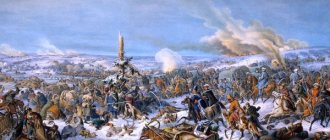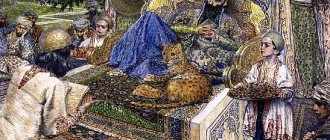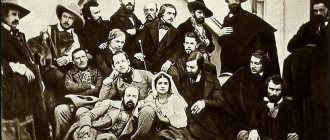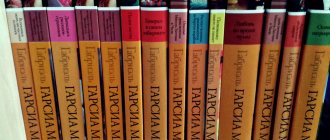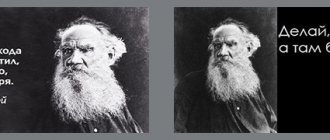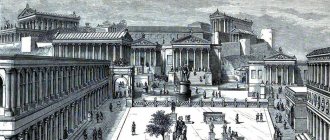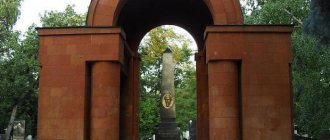Quintus Horace Flaccus , more often just Horace (65 – 8 BC) is an ancient Roman poet of the “golden age” of Roman literature. His work dates back to the era of civil wars at the end of the Republic and the first decades of the new regime of Octavian Augustus.
There are many interesting facts in the biography of Horace, which we will discuss in this article.
So, here is a short biography of Quintus Horace Flaccus.
Biography
Horace (Quintus Horace Flaccus) is an ancient Roman lyric poet of the “golden age” of ancient literature during the reign of Octavian Augustus, whose work was on the verge between independence and court slavery. He wrote the ode “Monument”, immortalized in adaptations and translations of great Russian writers. The author of the world's first autobiography, in his writings he told about himself, his character, habits and lifestyle.
Childhood and youth
Quintus Horace Flaccus was born on December 8, 65 BC. e. in the Italian city of Venosa, lying on the trade route between Apulia and Lucania. The region in which the future poet grew up was populated by emigrants who spoke different dialects, which contributed to the development of Horace's sense of language.
Portrait of Horace
The lyricist’s father spent part of his life in slavery; he was a man of outstanding abilities, which allowed him to gain freedom and improve the material and social life of his family. Nothing is known about Horace's mother, but his writings contain references to his nanny Puglia. The parent spent a small fortune on his son’s education; he moved to Rome to monitor the school success and moral development of the future lyricist.
Presumably, after the death of his father, at the age of 19, Horace left Rome and continued his studies in Athens, where at that time the Academy founded by Plato was located. The young man joined the student elite, made acquaintance with the son of Cicero, and became imbued with the traditions of classical Greek literature and philosophy.
Bust of Horace
After the assassination of Julius Caesar, Brutus came to Athens. In search of supporters of the republican cause, he attended lectures at Plato's Academy and recruited students. Horace, among other young men, entered the officer rank of military tribune, a position usually occupied by the descendants of equestrians or senators.
After the defeat of Brutus's army at the Battle of Philippi in the fall of 42 BC. e. the future poet, along with other soldiers and officers, left the unit's position. He reconsidered his political views and accepted the early amnesty offered to Brutus' supporters by the ruler Octavian.
Medieval image of Horace
Returning to Italy, Horace discovered that his father's estate in Venusia had been confiscated in favor of Caesar's veterans. The young man was reduced to poverty and turned to poetry, which could provide prospects for the future through acquaintance with writers and their wealthy patrons. He took up the position of scribe in the questura at the treasury and took up versification in 39-38 BC. e.
Friendship with Patron
Maecenas pondered for nine months and finally decided to bring Horace closer to him. Finding himself in such an environment, the poet still remained balanced and cautious, he never tried to stand out in any way, did not flatter anyone, and carefully followed all the socio-political reforms carried out by the ruler Octavian. Perhaps, in some ways, Horace did not agree with the ruler’s policies, but he was eternally grateful to him only for the fact that, after a hundred years of civil wars, the peace that everyone had been waiting for had finally returned to Italy.
Octavian made an offer to Horace to become his personal secretary, but such a position did not attract the poet, and he politely refused. Despite the fact that the position of secretary was very tempting and profitable, Horace did not want to lose his independence, which he greatly valued.
Horace traveled a lot with Maecenas. They visited Cape Palinure, where Octavian suffered a naval defeat, the Italian seaport of Brindisi, and Cape Actium, where the last great naval battle in antiquity took place between the ancient Roman fleets.
Horace repeatedly noted in his poems that their relationship with Maecenas was based solely on friendship and respect for each other, regardless of social status. Their relationship has never been of a “patron and subordinate” nature. Horace never abused this friendship and did not demand anything from Maecenas; he did not even try in this way to return his father’s house, which was confiscated in Venusia.
Poetry
The first stage of Horace's literary work includes the Epodes and Satires, written in Latin. The poems of the first collection, the form of which was borrowed from the ancient Greek satirist Archilochus, belong to iambic poetry, characterized by offensive vocabulary and condemning the social feelings of fellow citizens.
Horace reads his poetry to an audience
The Satires were written in a form of free dialogue unique to Latin literature. Philosophical thoughts, written in hexameter, were presented during a conversation with the audience and were accompanied by anecdotes, jokes, and live examples. Unlike his predecessor Lucilius, Horace wrote satirical works in the spoken language of an educated citizen. Ignoring sensitive political topics, the author, emphasizing his own individuality, turned to the social and ethical problems of ancient Rome and its inhabitants.
After the release of the first collections in 39-38 BC. e. Supporters of Octavian became interested in Horace. Virgil introduced the young poet into high Roman society through the ruler’s personal friend, Gaius Cilnius Maecenas, a fan of the fine arts.
Guy Tsilny Maecenas
Horace became close to his patron and in 37 BC. e. accompanied him on a journey to Brindisi, described in the poet's works as a series of funny incidents and sweet meetings along the way. In fact, the trip was of a political nature, which the young writer skillfully hid from the reader. According to researchers, Horace was with Maecenas in one of Octavian’s naval expeditions, as well as in the battle of Actium, which ended the period of Roman civil wars on September 2, 31 BC. e.
After the publication of the first book "Satyr" in the mid-30s BC. e. the poet received from his patrons a Sabine villa, located near the Italian city of Licenza. In addition to the estate, Horace received income from 5 tenants, which allowed him to end his career in the treasury and devote himself entirely to creativity.
Horace's book "Odes"
The next stage in Horace’s creative biography was the “Odes,” which were originally called “Songs.” The poet adapted their forms and themes from Greek lyrics of the 7th – 6th centuries BC. e. The odes were designed as a conscious imitation of the short lyric poetry of the Greek originals - Pindar, Sappho and Alcaeus. Horace's genius manifested itself in the application of old forms to modern reality.
The Odes demonstrated closeness to the regime and sensitivity to its evolving ideology. The texts touched on state affairs, without forgetting to emphasize the importance of private life. They covered a wide range of topics: love, friendship, wine, religion, morality, patriotism.
Portrait of Horace
In his odes, Horace praised Octavian in hyperbole, which echoed the expressive means of Hellenistic court poetry. In the period 27-24 BC. e. political allusions in the poet's works focused on foreign wars in Great Britain, Arabia, Spain and Parthia. Horace greeted Augustus on his return to Rome in 24 BC. e. as a beloved ruler, on whose good health his happiness depended.
The poet’s “Odes” did not gain popularity in society during the author’s lifetime. However, in the final poem of the 3rd book, “Exegi monumentum aere perennius” (“Monument” or “To Melpomene”), Horace predicted for himself the indestructible glory of the first and greatest of the lyric poets of Rome. This work outlived its creator and inspired many Russian poets. The whole world knows the translations and arrangements of the 30th ode of the 3rd book of Horace, performed by Mikhail Lomonosov, Gavriil Derzhavin, Afanasy Fet.
Book of Poems by Horace
In 21-20 BC. e. the poet lost interest in the odic genre and wrote a book of “Epistle” addressed to friends and acquaintances. The polite style of the poems in this collection reflected the new social status of the poet, who was knighted. The author stated that he was more interested in moral philosophy than literature. However, the stoicism did not reflect thoughts about ethics.
While writing the first book of the Epistles, Horace, demonstrating his own independence, distanced himself from the powers that be. He declined Maecenas's invitations to visit his patron. The theme of the 2nd collection was suggested to the poet by Emperor Augustus. He ordered a message in verse addressed to himself. The ruler offered the poet the position of personal secretary, but Horace rejected this idea, agreeing to write a literary letter.
Documentary about Horace
The Epistle to Augustus was published in 11 BC. e. It was devoted to literary theory and criticism, and contained references to the military exploits of the stepsons of Emperor Tiberius and Drusus. The poet dedicated an ode called “Anniversary Hymn” to a more detailed description of them, written for secular games in the Temple of Apollo and performed by a choir of young men and women in 17 BC. e.
Influence
The poet himself measured his literary immortality in the “Monument” by the eternity of the Roman state, but the greatest flowering of his fame was still ahead. Since Carolingian times, interest in Horace has increased; evidence of this interest is provided by the 250 surviving medieval manuscripts of his works. During the early Middle Ages, the moral and philosophical works of Horace, satires and especially epistles attracted more attention than lyrics; Horace was revered as a moralist and was known mainly as the author of satires and epistles. To him, the “satirist Horace,” Dante (Hell IV) assigns a place in Hades after Virgil and Homer.
The Renaissance brought with it a new assessment, when the emerging “bourgeois personality” opposed itself to “church contemplation.” (It is known that in 1347 Petrarch acquired a manuscript of Horace’s works; some of his poems show a clear influence of Horace.) As a lyrical exponent of this new worldview, Horace became the favorite poet of the Renaissance (along with Virgil, and often surpassing him). Humanists considered Horace completely “one of their own”; but the Jesuits also valued him highly - the emasculated or Christianized Horace had a positive moral influence on his students. Pictures of simple village (“Horatian”) life appealed to people of a similar fate and similar tastes (such as, for example, Petrarch, Ronsard, Montaigne, Robert Herrick, Ben Jonson, Milton).
Horace's lyrical meters were used in New Latin versification, which is believed to have been especially successful by the German humanist Conrad Celtis, who also established the custom of singing Horace's odes in school (which became a widespread practice in the 16th century). Subsequently, Horace began to be translated into new languages (most successfully, it is believed, into German).
In Russia, Horace was imitated by Cantemir; Pushkin, Delvig, Maikov and others were fond of it.
The Art of Poetry had a tremendous influence on literary criticism; Classical principles were borrowed from it, and efforts to curb the excesses of the Baroque were justified with references to it. Boileau borrows a lot from Ars poëtica for his Poetics; Byron admires him, Lessing and others study him. However, Sturm und Drang and other movements of the romantics were not on the way with the “singer of prudence, balance and moderation,” and from then on Horace’s popularity no longer rose to its previous heights.
After the invention of printing, no ancient author was published as many times as Horace. His legacy caused a huge number of both New Latin and national imitations and played a large role in the formation of New European lyrics.
A crater on Mercury is named after Horace.
Personal life
Horace loved loneliness; he had neither a wife nor children. He surrounded himself with priestesses of love - hetaeras. The man dedicated many poems to the whims of his lovers, who preferred young handsome men to the poet. Contemporaries believed that this was not surprising; they described his portrait as follows: “short, pot-bellied, bald.”
Portrait of Horace
His muses were the Thracian Chloe, “skilled in singing and playing the zither,” the charming Barina, distinguished by her beauty and cunning, the traitor Neera and Phyllida, whom the poet called his last love.
Horace indulged in carnal pleasures on the Sabine estate. According to biographers, the walls of his bedroom were covered with mirrors and obscene photographs so that the poet could see erotica everywhere, which occupied not the least place in his personal life. For official meetings and receiving high-ranking guests, the writer purchased a second estate in a wealthy area of Rome.
Death
Horace died on November 27, 8 BC. e. Shortly before his death, the poet predicted in one of his poems that he would not outlive his friend and patron Maecenas. The premonition came true.
Monument to Horace
The exact cause of death of the lyricist has not been established. It is known that shortly before his birthday he was overtaken by a sudden illness. According to his will, his property became the property of Emperor Augustus, who perpetuated the poet's memory by ordering his works to be studied in schools and academies.
Horace was buried in Rome on the Esquiline Hill, not far from the grave of Maecenas.
Sayings
Carpe diem - “seize the day” (Carmina I 11, 8). In full: “carpe diem quam minimum credula postero”, “take advantage of (every) day, relying as little as possible on the next”
Dulce et decorum est pro patria mori - “It is beautiful and sweet to die for the fatherland” (Carmina III 2, 13). A slogan often used in World War I newspapers; also the title of the English poet Wilfred Owen's bitterly ironic poem "Dulce Et Decorum Est" about this war.
Sapere aude - “decide to be wise” (Epistulae I 2, 40). The saying was adopted by Immanuel Kant and became a kind of slogan of the Age of Enlightenment. This saying is the motto of the Moscow Institute of Physics and Technology (option “dare to know”).
Bibliography
- 35 BC – “Sermonum liber primus, Satyrs I”
- 30 BC – “Epodes, Epodes”
- 30 BC – “Sermonum liber secundus, Satyrs II”
- 23 BC – “Carminum liber primus, Odes I”
- 23 BC – “Carminum liber secundus, Odes II”
- 23 BC – “Carminum liber tertius, Odes III”
- 20 BC – “Epistularum liber primus, Epistles I”
- 24 or 10 BC – “Ars Poetica, Epistle to the Pisoes”
- 17 BC – “Carmen Saeculare, Hymn of the Ages”
- 14 BC – “Epistularum liber secundus, Epistles II”
- 13 BC – “Carminum liber quartus, Odes IV”
